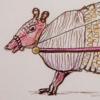All the Signs We Cannot See
Slackpole
The world became a painful, swirling blur in late October 2016. We lost our younger daughter shortly after the Wild Rumpus ended and before the dawn. In the moonless wee hours of Oct. 30, exhausted and emotionally drained, Laura ended her life in a dark Chase Street backyard.
Weeks later, I sat alone at Ciné waiting for The Burden—a documentary on fossil fuels—to begin. A young woman sat next to me and asked what was wrong. We started to talk. “Watch for signs,” she said after learning about Laura. “There are connections that can’t be explained, but you’ll understand them.” She had lost her brother the same way, too.
At first, her comments didn’t make much sense. Then they did.
While my husband worked in Canada, I stayed in Athens and drove my old car with a leaking tire. Dumb move, but what mattered anymore? It went flat by the Loop near Tallassee Road, so I bumped along into the gas station to change it. While I struggled in a downpour to loosen the lug nuts, a pickup truck pulled up next to me.
A young man jumped out and offered to help. While we worked (mostly he did), the fellow talked about his family. He and his wife were having a troubled relationship. He wondered aloud if it was even worth living anymore. “Listen,” I said. “I just lost my daughter to suicide. The pain is killing all of us. You’ve got a daughter. She needs you. Get counseling; get help. You are needed on Earth.” He looked startled and replied, “Well, looks like you’re the one who just helped me.” He drove away wet and late for work, but in a better place. Was this a sign? (The last time I had changed a tire was with Laura, on the way to a college interview.)
On Dec. 25, my husband Mike, his sister Betsy and I were at Jekyll Island with our older daughter Mary and son-in-law Lorenzo. As we watched the morning sunlight dance across the ocean, I called out to the rolling waves, “Laura, if you are here, send a dolphin.” But wild animals can’t be called to appear; they follow their own instincts. It was time to turn away, yet Mike kept watching. Suddenly, he hollered, “Come back. Look!” Sure enough, a dolphin rose up to the surface. It felt magical, watching the beautiful mammal with its glistening back gliding through the water with such grace. (Laura’s middle name was Grace.)
Later that day, Betsy and I walked along the beach to the northern end of the island as the tide was rising. We looked up to see the dolphin arcing through the water alongside us. It stayed with us the whole way. When we met the rest of the family at the fishing pier, the setting sun created a curious display of colors. Half of the sky gleamed with shades of pink and purple (Mary’s favorite colors), a silver cloud zig-zagged through the middle, and the rest of the sky brightened with layers of oranges and yellows (Laura’s favorites). What a gift!
On Jan. 1, 2017, the gray sky and drizzle matched our moods: a new year without Laura. I saw only crows in the early morning rain. But a few weeks later, Mike and I were invited to Cedar Key, FL, where gusty winds and bright sunshine energized us. On our last day there, the wind rose and clouds rolled in as we followed the boardwalk to the water’s edge at Cemetery Point Park to sprinkle some of Laura’s ashes into the waves. As we were leaving, a flock of white ibises flew near us. Then a Roseate Spoonbill rose into the air and hovered above us. The large bird was bucking the powerful wind, which held it in place over our heads. Suddenly, golden beams of sunlight burst through the clouds onto the bird’s wings, making them glow a brilliant, spectacular pink. Another sign? (Friends and family members often tell us that Laura had a special light.)
Harvard professor and physicist Lisa Randall wrote, “We often fail to notice things that we are not expecting.” Perhaps, after Laura’s death, we notice more because of heightened expectations. Clearly, we are less likely to brush off such events as mere coincidences.
More by Liz Conroy
-

Sweet, Scary, Sad: Engaging Our Dreams
Slackpole
-

-

Armadillos and Gardens
Slackpole










comments